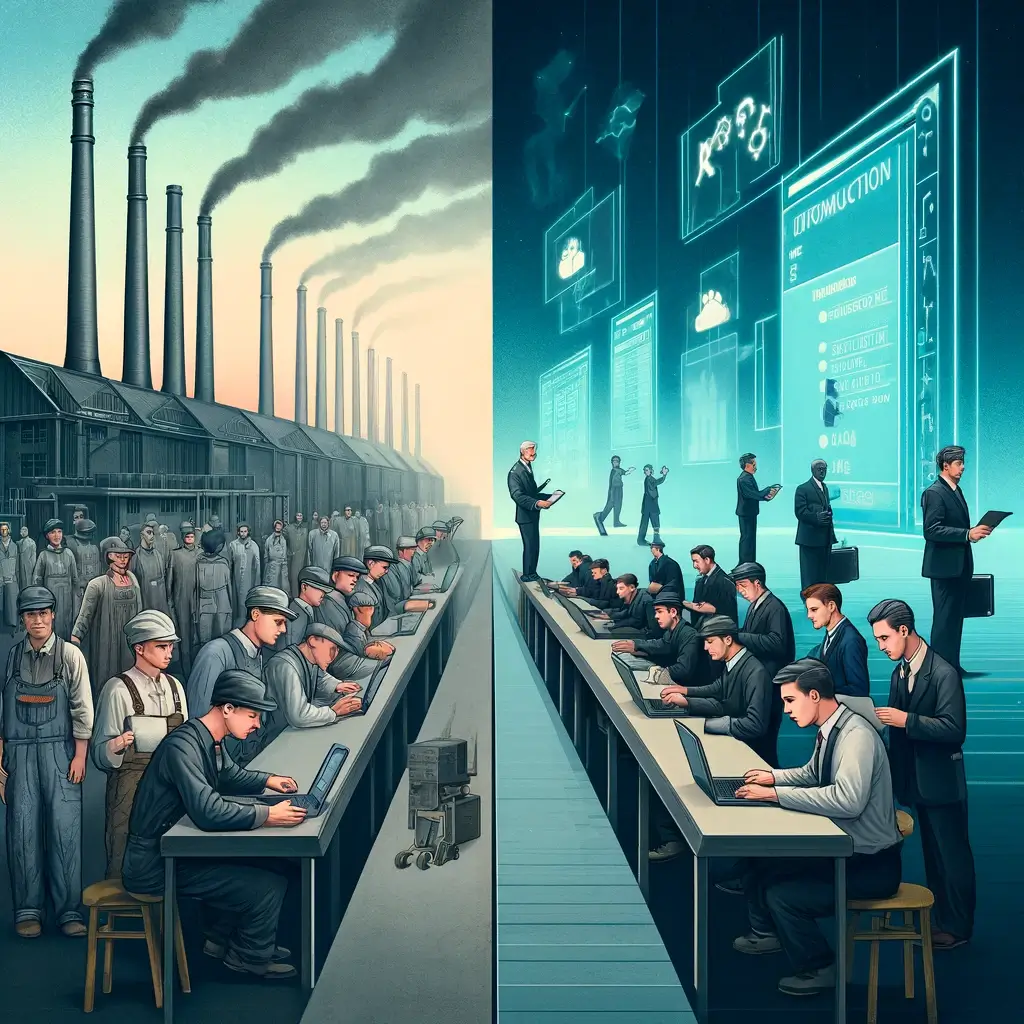You cannot depend upon conventional information sources to give you an objective and timely warning about how the world is changing and why. If you wish to understand the great transition now under way, you have little choice but to figure it out for yourself.
This book explains so much about what is going on in the economy today
In the past, we had a the following stages of human progress which can be loosely written as follows:
- Nomadic Tribal Economy – Hunter Gatherer
- Agrarian Economy – Farmers
- Merchant Economy – Traders
- Industrial Economy – Factories
- Digital Economy – Internet
We are currently moving from the Industrial Economy to the Digital Economy
The key difference is that in the industrial economy – economies of scale were important. In the digital economy efficiency is more important.
In the industrial economy, the important factor was having economies of scale. 10,000 people working together less efficiently in a bigger factory would beat a company with 10 people and drive them out of business.
As a result the importance of numbers rose as an advantage, and equality rose, and people were paid the same regardless of their work and output.
“That is not my job” was a widely heard slogan that underscored the “organizational slack” of the Industrial Age.
In “The Sovereign Individual,” the authors argue that in the industrial age, many people were paid more than they might have been worth in terms of their actual productivity or value creation. This discrepancy can be attributed to several factors:
- Unionization and Collective Bargaining: In the industrial age, the rise of labor unions and collective bargaining allowed workers to negotiate higher wages and better working conditions. This often resulted in wages that were higher than what might have been dictated by market forces alone.
- Minimum Wage Laws: Government-imposed minimum wage laws also contributed to workers being paid more than they might have been worth in a purely market-driven economy. These laws set a floor for wages, ensuring that workers received a certain level of income regardless of their productivity.
- Standardization of Wages: In many industrial settings, wages were standardized for certain positions, meaning that workers in the same role were paid the same amount regardless of individual productivity. This could result in some workers being paid more than their individual contribution warranted.
- Bureaucratic Structures: Large industrial organizations often had complex bureaucratic structures with many layers of management. In such environments, compensation was frequently tied more to position in the hierarchy than to actual productivity, leading to some individuals being paid more than their direct contribution to the organization’s output.
- Lack of Precision in Measuring Productivity: In many industrial jobs, it was difficult to precisely measure an individual worker’s productivity. As a result, compensation was often based on broader metrics that might not accurately reflect each person’s value to the organization.
The authors suggest that in the information age, these dynamics are changing. With the rise of the digital economy, it’s becoming easier to measure individual productivity and value creation more precisely, leading to a more meritocratic system where compensation is more closely aligned with actual contributions.
In the digital economy, efficiency is more important, which emphasizes using technology to streamline processes, reduce waste, and enhance customer experiences.
This shift allows even smaller companies to compete effectively by leveraging data, automation, and digital platforms to operate more efficiently and respond quickly to market changes. It’s a trend that reflects the growing importance of agility, innovation, and sustainability in the modern economy.
Content can be replicated for free, which means one person can create software that turns into billions of dollars.
Small companies such as instagram and whatsapp can sell for billions of dollars because of their use of technology.
“One effect of such technology is to reduce the necessity of hiring large numbers of middle managers to monitor production processes.”
“The changes implied by the Information Revolution will tend to disintegrate all large structures.”
“Good jobs” will be a thing of the past. A “good job,” as Princeton economist Orly Ashenfelter put it, “is a job that pays more than you are worth.”
“During the industrial period, the factor that contributed most to determining the ordinary person’s lifetime income was the political jurisdiction in which he happened to reside.”
“If the world operates as one big market, every employee will compete with every person anywhere in the world who is capable of doing the same job. There are lots of them and many of them are hungry.”
“As borders disappear, the concept of entitlement—the belief that because you were born in a particular place, you are entitled to the economic advantages associated with that place—falls apart and as it falls apart jurisdictional advantages that led to widening inequality between rich and poor economies during the industrial period will change dramatically.”
“For the first time, those who can educate and motivate themselves will be almost entirely free to invent their own work and realize the full benefits of their own productivity.”
“I know of no more encouraging fact than the unquestionable ability of man to elevate his life by conscious endeavor.”
“In an environment where the greatest source of wealth will be the ideas you have in your head rather than physical capital alone, anyone who thinks clearly will potentially be rich.”
“the elite of the Information Age are specialists in production”
